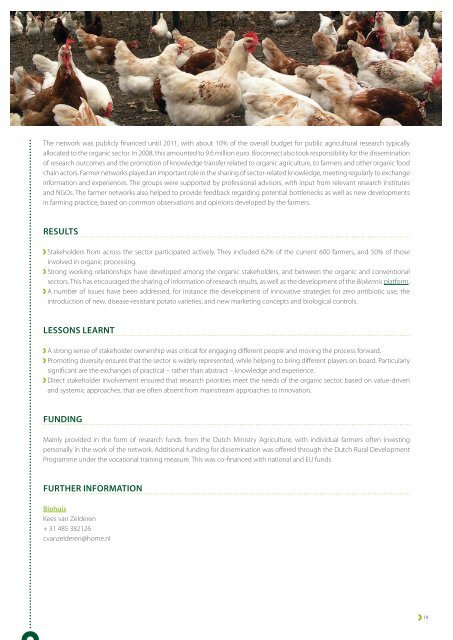ORGANIC COOPERATIVE APPROACHES TO RURAL DEVELOPMENT
Qgy8k
Qgy8k
Create successful ePaper yourself
Turn your PDF publications into a flip-book with our unique Google optimized e-Paper software.
The network was publicly financed until 2011, with about 10% of the overall budget for public agricultural research typicallyallocated to the organic sector. In 2008, this amounted to 9.6 million euro. Bioconnect also took responsibility for the disseminationof research outcomes and the promotion of knowledge transfer related to organic agriculture, to farmers and other organic foodchain actors. Farmer networks played an important role in the sharing of sector-related knowledge, meeting regularly to exchangeinformation and experiences. The groups were supported by professional advisors, with input from relevant research institutesand NGOs. The farmer networks also helped to provide feedback regarding potential bottlenecks as well as new developmentsin farming practice, based on common observations and opinions developed by the farmers.RESULTSStakeholders from across the sector participated actively. They included 62% of the current 600 farmers, and 50% of thoseinvolved in organic processing.Strong working relationships have developed among the organic stakeholders, and between the organic and conventionalsectors. This has encouraged the sharing of information of research results, as well as the development of the Biokennis platform.A number of issues have been addressed, for instance the development of innovative strategies for zero antibiotic use, theintroduction of new, disease-resistant potato varieties, and new marketing concepts and biological controls.LESSONS LEARNTA strong sense of stakeholder ownership was critical for engaging different people and moving the process forward.Promoting diversity ensures that the sector is widely represented, while helping to bring different players on board. Particularlysignificant are the exchanges of practical – rather than abstract – knowledge and experience.Direct stakeholder involvement ensured that research priorities meet the needs of the organic sector, based on value-drivenand systemic approaches, that are often absent from mainstream approaches to innovation.FUNDINGMainly provided in the form of research funds from the Dutch Ministry Agriculture, with individual farmers often investingpersonally in the work of the network. Additional funding for dissemination was offered through the Dutch Rural DevelopmentProgramme under the vocational training measure. This was co-financed with national and EU fundsFURTHER INFORMATIONBiohuisKees van Zelderen+ 31 485 382126cvanzelderen@home.nl19


